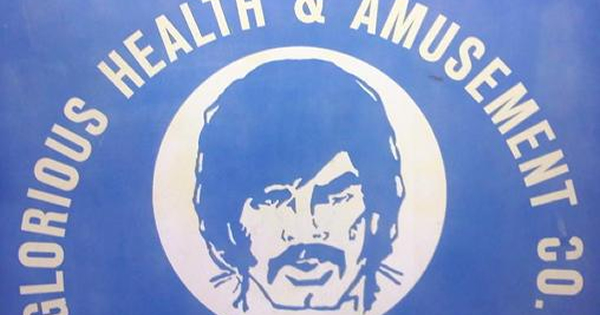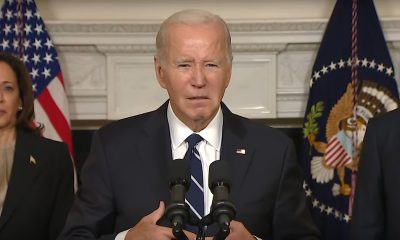National
HRC affirms 'Don't Ask' repeal for 2010
The Human Rights Campaign is affirming its commitment to repealing “Don’t Ask, Don’t Tell” this year as part of its legislative agenda in Congress.
HRC President Joe Solmonese outlined during a Feb. 27 fundraising dinner speech in Raleigh, N.C., expectations for the passage of pro-LGBT federal legislation in Congress, including the repeal of the 1993 barring open service in the U.S. military.
In a DC Agenda interview following the event, David Smith, HRC’s vice president of programs, elaborated on the remarks that Solmonese gave during the dinner.
Smith restated HRC’s commitment to seeing this year the enactment of domestic partner benefits for federal workers, domestic partner tax relief and the Early Treatment for HIV Act, as well as repeal of “Don’t Ask, Don’t Tell.” He also cautioned against reading too much into the Solmonese’s remarks and said HRC is working on other tasks beyond what Solmonese mentioned.
DC Agenda: Joe said during the dinner that “Don’t Ask, Don’t Tell” would be brought to an end this year. What is your plan for making that happen?
David Smith: Well, Chris, we’ve been talking about that for months, and there’s been a lot of public dialogue on a path to repeal “Don’t Ask, Don’t Tell.” There are obviously a number of options on the table. Somebody just reminded me you have our campaign, so you are well aware of how we hope to move forward on that. (Editor’s note: See “Questions surround Lieberman’s ‘Don’t Ask’ repeal bill”)
Agenda: But what leads you to believe you can accomplish “Don’t Ask, Don’t Tell” repeal this year?
Smith: We’ve been saying that for months — that this is year for it to be repealed and we’re mobilizing our campaign to accomplish just that.
Agenda: What has the White House been saying on this issue? Does the White House want repeal this year or does it want to wait until the Pentagon review is finished?
Smith: The White House has publicly said that they’re following this process that was set up with [Defense Secretary Robert] Gates and [Chairman of Joint of Chiefs of Staff Adm. Michael] Mullen — and that’s precisely what they’re doing is — following the process that was outlined at the Senate Armed Services Committee however many weeks ago that was now.
Agenda: What will happen if repeal doesn’t happen this year?
Smith: We fully expect repeal to happen this year. That’s what we’re working towards.
Agenda: What about two items Joe mentioned that were in the House version of the health care reform: the domestic partner tax penalty elimination and the Early Treatment for HIV Act? They’re not in the president’s proposed legislation. Do you plan to have those provisions moving forward as part of the health care package?
Smith: As far as I understand, the plan right now is that he put forward some broad outlines in terms of how the Senate bill can reconcile with the House bill. And every particular wasn’t included in those policy proposals, so it is still our hope that DP tax and ETHA will be included in whatever fix is — whatever they come up with to reconcile those two bills.
Agenda: How do you see the process going to move forward with health care reform?
Smith: Well, Chris, every reporter in this city, whether they work for DC Agenda or the New York Times is trying to figure out exactly how the process is going to work. They are still figuring it out, or if not still figuring it out, they’re not being open about how it moves forward.
I’ve read many different things, and they certainly are not talking to a whole bunch of people about it. But one version is the House passes the Senate bill, and the Senate introduces a reconciliation bill that fixes the Senate in accordance to what the House wants. There’s many different ways that this could all shake out. But it is still our hope that DP tax relief and ETHA will be included in whatever final resolution there is.
Agenda: And you’re expecting that to happen this year?
Smith: Yes.
Agenda: What about the Domestic Partnership Benefits & Obligations Act? What do you see as the path for that legislation now?
Smith: Well, as you well know, it’s been passed out of both committees in both the House and Senate in various committees of jurisdiction. It is probably our most ripest piece of legislation in terms of how many times it has had a hearing and markup, so again it is our ripest piece of legislation and indications are that it will happen this year.
Agenda: And you’re expecting it to happen this year?
Smith: Yes.
Agenda: I know there was an issue with how Sen. Joseph Lieberman wanted the U.S. Office of Personnel Management to provide information it would offset the costs of that legislation within the existing budget. Do you know if that issue has yet been resolved?
Smith: I don’t believe it has, but I still think they are definitely looking for an offset and we have every reason to believe that they’re going to find it.
Agenda: Do you have any expectations for a timeline on when we can see floor votes on this legislation in either the House or the Senate?
Smith: No. I mean, I think the rest of the [congressional] calendar is completely up in the air this year.
Agenda: Joe mentioned four things that were part of the calender this year. Why wasn’t [the Employment Non-Discrimination Act] included among these four?
Smith: Joe spoke about ENDA in those remarks. It was one speech in one part of the country. It’s not going to be — one speech is not reflective of what we’re working on.
Clearly, there’s a very good possibility there could be movement on ENDA in the House. As you reported, there are issues with the Senate. We’re all, as a coalition, [we] are continuing to work through those issues. And you come to work every day trying to pass legislation, and ENDA is one of our top priorities. And each and every day we’re fighting for it, and you keep pressing until these things happen.
Agenda: But do you think there is as strong a possibility of passing ENDA as the other four things we just talked about?
Smith: Again, I think there are issues in the Senate, which I think are challenges, and we’re working through those challenges with our colleagues and our coalition.
Agenda: Another thing that wasn’t mentioned in Joe’s speech was the Uniting American Families Act. Do you think attaching as part of comprehensive immigration reform can lead to passage of UAFA this year?
Smith: We continue to press to get UAFA into the process. UAFA is one our priorities, and we continue to work on that as well.
Again, Chris, I want to stress, one speech is not going cover every single issue that we’re working on. You should be aware of that. So one speech does not an entire agenda make.
We’re continuing to work on repealing [the Defense of Marriage Act], UAFA, domestic partner benefits for federal employees. There’s a list of efforts that we’re working towards and each one is in various stages of the process.

It is common knowledge that women earn 84% of the average worker. Less common knowledge? Trans women earn 60% of the average worker. Trans men and non-binary people come in at around 70%, while 16% of all trans people make less than $10,000 annually.
E.C. Pizarro was lucky, and he knew it. He had a BFA in graphic design and had taught himself how to code. As a stealth trans man in a corporate job, he had access to a stable wage and good benefits. “People that do not have experiences in corporate America or with equitable employment don’t realize [these things] are privileges that a lot of people don’t have access to.”
He wanted to give back and was gearing up to bring more volunteer work into his life by participating in a fraternity for trans men. When he went to a TransTech event and learned about the educational and career resources for trans people who face barriers to entering the workforce, he knew he had found his place.
At the event he met, Angelica Ross. Yes, that Angelica Ross, of “Pose” and “American Horror Story.”
Before she was Candy, Ross was a self-taught coder. She went from posing for an adult website to doing its back-end coding to teaching her trans siblings how to succeed in tech.
“Technology was the key to my freedom,” Ross said in an interview with The Plug. “Technology took me from being exploited on someone’s website to building my own websites and to building websites for other people and getting paid to do so.”
Pizarro was impressed and wanted to help. “I went up to Angelica and I was like ‘Hey, I’m a trans man. These are my skills. I’m down to volunteer and do any type of work—the one caveat is that I’m stealth. You can’t tell anybody that I’m trans.’”
For four years, Pizarro helped from mostly behind the scenes, sometimes getting side-eyed since people thought he was a cis man in trans spaces. “I was still stealth as the Director of Social Media and Communications for the National Trans Visibility March in 2019,” Pizarro says, chuckling a little.
But by that point, Ross — who headlined the 2019 march — was overextended trying to balance being a world-famous actress, advocate, and businesswoman.
She needed someone to step in as executive director of TransTech and looked to the group of dedicated volunteers. Pizarro was elected by his peers to take the reins of the organization.
This was a turning point for Pizarro. “I’m very passionate about tech and for me a small sacrifice of being open with my trans experience to liberate other trans people,” he said. “I felt like if that’s something I got to do, then I’m gonna do it.”
And he did it. The infrastructure Ross put together worked: with mentorship, education, community, and networking with trans-accepting employers, trans people were gaining financial security and independence.
So, Pizarro focused on expanding TransTech as widely as possible. “We have grown exponentially over the last three years,” he says. “When I took over in 2021, we had about 800 members based in the United States. Now we support over 6,700 members across 50 countries.”
TransTech is filling a demonstrated need within specifically the trans community. New research from LGBT Tech found that 68% of transgender adults use the internet to find LGBTQ-friendly employment (compared to 38% of cisgender LGBTQ+ adults). More than 70% of all LGBTQ adults use the Internet to access educational content.
Accessibility is central to the TransTech programming. Despite the growth, everything remains free. “There’s no membership fee. All of our programming is free. All of the certifications and educational resources are free,” Pizarro says.
They know the financial burden the trans community faces — 29% of trans adults live in poverty. “If we’re asking anyone to up-skill [for a cost] and these are the things they are going through, we are asking them to invest in their future versus their meal today.”
Pizarro believes that accessibility is more than just making the training free. He wants the community to understand that tech work is something they are innately capable of doing.
“TransTech was built on the foundation of nontraditional tech. It’s not always coding. It’s graphic design. It’s social media. It’s video editing. It’s anything that uses a piece of technology and nowadays almost everything uses a piece of technology,” says Pizarro.
He emphasizes to participants: “You’re in tech and you don’t even know it,” pointing out how many already utilize tech skills like marketing and monetization with their social media accounts.
Some people involved in the programming are nervous about entering the “tech world” because of headlines about tech layoffs. He makes sure to emphasize that unlike in some other jobs, tech companies often pay generous severance packages, which gives employees “breathing room.” Pizzaro explains that “once you have experience with one tech company, you can go someplace else and make a substantial amount of money as well.”
While TransTech is designed for the gender-diverse community, the programming is open to everyone Pizarro explains. “We just ask that you don’t be transphobic.” (Or any of the other -phobics too, he says, listing them off.) He also emphasizes that this allows trans members who are not out to comfortably participate.
Pizarro wants everyone to understand that they don’t just belong in tech, but they make tech better. “Tech is most profitable when you have diverse people building the tech and using the tech,” Pizarro says. “There is an intentional funding as well as support to diversity tech because they understand how that impacts the product.”
He also reminds participants that they have developed transferrable skills in every part of their lives. “I like to tell people if you can manage your life as a trans person in the United States or anywhere you can manage a project.”

District of Columbia
Fire by arson forced temporary shutdown of Glorious Health Club
Spa and art gallery catering to gay
men expects to reopen in August

In a little noticed development, D.C.’s Glorious Health Club, which bills itself as a spa, art gallery, and community center catering to gay men, was forced to close on May 19 after one or more unidentified suspects ignited a fire inside the club that D.C. fire department officials have ruled an act of arson.
Robert Siegel, the club’s owner, told the Washington Blade that he and investigators with the D.C. Fire and Emergency Medical Services Department believe one or more yet unidentified suspects broke into the kitchen of the former warehouse building where the club is located at 2120 West Virginia Ave., N.E.
According to Siegel, investigators with the fire department’s arson squad believe a flammable liquid was used to start the fire in the kitchen and in two other locations within the building.
“Three separate fires were started,” Siegel said. “They started one on a staircase and one on the upstairs storage area,” he said in addition to the one in the kitchen. He said about 40 patrons were in the club at the time the fire started, and all were able to leave without injury.
Siegel said the fire caused $500,000 worth of damage to his building, with some of the damage caused — understandably he said — by fire fighters who had to rip open doors and break through the roof to gain access to the flames that engulfed parts of the interior of the building. He said he arranged for repair work to begin after the fire was extinguished.
“I expect we’ll be reopening in about a month from now,” he said. “And we’ll be a bigger and better place.”
Fortunately, Siegel said, most of the artwork and art exhibits located in the club were not damaged.
“It was basically the kitchen, patio, and the roof,” he said, adding that much of the solar panels he had on the roof were destroyed by the fire or by firefighters seeking to gain access to the building.
“And the fire was so hot it did structural damage to the roof,” he said. “It actually melted steel. We’re talking about 50-foot steel beams that have to be replaced,” he told the Blade. “That’s $100,000 right there.”
Vito Maggiolo, a spokesperson for the D.C. Fire and Emergency Medical Services Department, said the fire was “ruled incendiary/arson” and is “under active investigation.”
It could not immediately be determined if one or more people responsible for the fire targeted the Glorious Health Club because it’s a gay community establishment.
National
House Republicans propose steep cuts in federal AIDS budget
Advocacy groups say move would eliminate ‘Ending HIV Epidemic’ initiative

The Republican-controlled U.S. House Subcommittee on Labor, Health, and Human Services, Education, and Related Agencies approved a spending bill on June 26 that calls for cutting at least $419 million from federal AIDS programs that AIDS activists say would have a devastating impact on efforts to greatly reduce the number of new HIV infections by 2030.
The subcommittee’s proposed bill, which includes billions of dollars in cuts in a wide range of other federal health, education, and human services related programs, is scheduled to be considered by the full House Appropriations Committee on July 10. Officials with AIDS advocacy groups say they are hopeful that the full committee, like last year, will refuse to approve the proposed cuts in the AIDS budget.
The proposed GOP cuts would eliminate $214 million from the U.S. Centers for Disease Control and Prevention’s HIV prevention programs, $190 million from the Ryan White HIV/AIDS Program, and $15 million from the Department of Health and Human Services Secretary’s Minority HIV/AIDS Program.
Activists say the impact of those cuts would kill the federal government’s Ending the HIV Epidemic initiative, which among other things, calls for reducing the number of new HIV infections in the U.S. by 75 percent by 2025 and by 90 percent by 2030. The activists point out that ironically the Ending the HIV Epidemic initiative was launched during the administration of President Donald Trump.
“Instead of providing new investments in ending HIV by increasing funding for testing, prevention programs, such as PrEP, and life-saving care and treatment, House Republicans are again choosing to go through a worthless exercise of cutting programs that the American people depend on and will never pass,” said Carl Schmid, executive director of the HIV + Hepatitis Policy Institute.
“While we vigorously fight these cuts, we look forward to working with the entire Congress in a bipartisan fashion on spending bills that can actually become law,” Schmid said in a statement.
Schmid noted that the bill also includes provisions known as “policy riders” that would take away rights and protections from women, such as access to birth control and abortion, and for minorities, including LGBTQ people.
According to a statement released by the office of Rep. Rosa DeLauro (D-Conn.), who is the ranking minority member of the House Appropriations Committee, one of the policy riders would “block the Biden administration’s policies to ensure nondiscrimination on the basis of gender identity and sexual orientation.’ The statement says another policy rider would “prevent policies or programs intended to promote diversity, equality, or inclusion.”
Most political observers believe the Democratic-controlled U.S. Senate would also kill the GOP proposed policy riders and cuts in the AIDS budget if the full Republican-controlled House were to approve the budget bill passed by the appropriations subcommittee.
Rep, Tom Cole (R-Okla.), who serves as chair of the full House Appropriations Committee, released a statement on June 27 defending the subcommittee’s bill and its proposed spending cuts. “The bill provides appropriate and fiscally responsible funding to ensure these departments can continue to perform their core missions while also acknowledging the fiscal realities facing our nation,” he said.
“Importantly, the bill pushes back on the Biden administration’s out-of-touch progressive policy agenda, preventing this White House from finalizing or implementing controversial rules or executive orders,” Cole said in his statement. “It also preserves long standing bipartisan policy provisions protecting the right to life.”
-

 Canada2 days ago
Canada2 days agoToronto Pride parade cancelled after pro-Palestinian protesters disrupt it
-

 Baltimore4 days ago
Baltimore4 days agoDespite record crowds, Baltimore Pride’s LGBTQ critics say organizers dropped the ball
-

 Sports5 days ago
Sports5 days agoHaters troll official Olympics Instagram for celebrating gay athlete and boyfriend
-

 Politics1 day ago
Politics1 day agoHRC slams White House over position opposing gender affirming surgeries for minors











